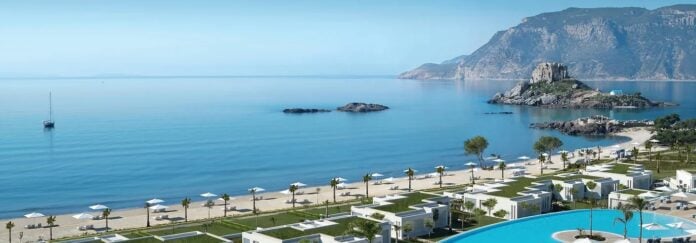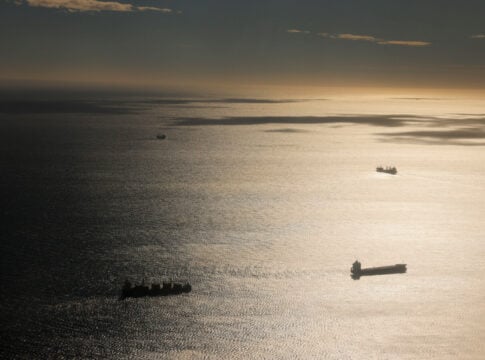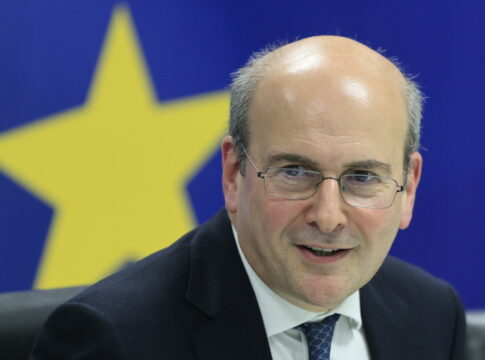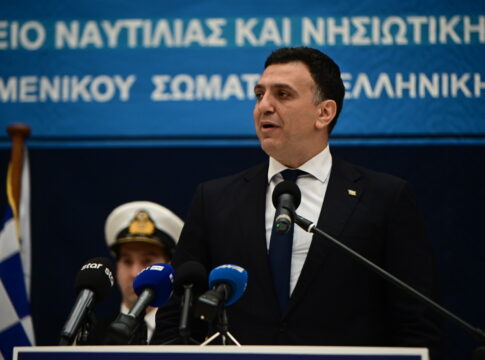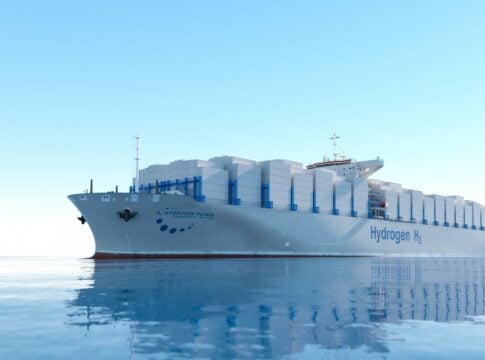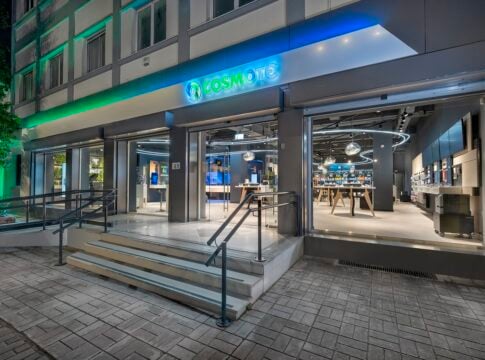“With climate change, biodiversity loss and plastic pollution threatening the tourism development of the Mediterranean – and beyond – sustainability is a one-way street,” Eleni Andreadis, director of Sustainability and Corporate Social Responsibility of the Sani/Ikos Group, stated in an interview with “Naftemporiki”, stressing that the group has set an ambitious, triple goal of zero carbon (net zero) by 2030, zero plastics and zero waste by the end of 2024.
According to Eleni Andreadis, “in Greece, where 75% of the market consists of smaller businesses, the implementation of integrated sustainability strategies is a big challenge.” She added that the problem of hypertourism has, to a large extent, to do with the mismanagement of destinations. This mismanagement, unfortunately, is related to how we ourselves live in our place – the management of natural resources, the respect for ecosystems, the quality of infrastructure – not just the tourism product.”

1. Why is sustainability a necessity for the Sani/Ikos Group and tourism in general?
Sustainability is a prominent global trend across all industries, especially tourism. The effects of climate change, impacting -sadly- our daily lives, the increased social needs, our need for authentic experiences and meaningful connections with the destinations we visit have brought sustainability to the heart of the hospitality sector.
At Sani/Ikos Group, we have integrated the principles of sustainable development into our strategy for over a decade, investing in areas such as net-zero cardon emissions and zero-waste operations, ecosystem preservation, local community support, and the development of our people. Our key priority is to offer our guests top-quality hospitality and unique experiences with respect for each destination, continuously increasing our positive impact on the regions in Greece and Spain where we operate.
2. How did you transform Sani Resort and Ikos Resorts into ‘green’ destinations?
We have been working intensively on the goals and initiatives of our Sani Green and Ikos Green programmes for over 15 years.
When it comes to protecting the environment and mitigating climate change, we have adopted strict criteria and KPIs. Our goal is to achieve net zero carbon emissions by 2023, well ahead of the European target of 2050. To this end, we invest in energy monitoring and conservation systems, large-scale renewable energy projects, electrification of our facilities and fleet, and certification of our buildings -both new constructions and renovations- with LEED and BREEAM standards. We are already approaching zero scope 1 and 2 emissions (direct and indirect emissions from purchased electricity), while all our hotels are carbon neutral, certified under the ISO 14064-1:2018 standard. Ikos Olivia in Halkidiki is the first resort in Greece and only the third in Europe to receive the esteemed LEED O&M Gold certification for existing buildings. Additionally, Sani Asterias in Halkidiki, currently undergoing renovation, and Ikos Kissamos in Chania, which is under development, are in the process of LEED Building Design and Construction certification. Ikos Porto Petro in Mallorca stands out as the first newly built hotel on the island to be certified by BREEAM.
In line with our sustainability goals, we are also focusing on reducing food waste with the help of artificial intelligence systems, composting organic waste, and recycling all our packaging by sorting at source over 20 different materials. By the end of the year, our aim is to produce zero waste-to-landfill and eliminate single-use plastics across all our operations.
Additionally, we work intensively with scientific institutes and NGOs to protect vital Mediterranean ecosystems, such as the Sani wetlands and coastal Pine Forest, the dolphin populations in the Aegean, and bee colonies; we monitor a range of indicators related to our contribution to the local community; we promote local products and traditions. Every year, we support the work of approximately 40 organizations, mainly local ones, focusing on vulnerable families and children, among many other initiatives.
3. In which areas should hospitality businesses focus on regarding sustainability?
Sustainability in the tourism sector is a collective effort involving businesses, governments, communities, and visitors alike. In Greece, implementing comprehensive sustainability strategies is a significant challenge as almost 75% of the market consists of SMEs. Investing in sustainability means investing in infrastructure and specialized processes, properly trained personnel, and targeted initiatives and projects covering the entire ESG spectrum. This can be hard to achieve for smaller hotels.
However, there are many steps a hotel can take towards sustainability, even with limited resources. Sustainability certifications, verified by independent third parties, are an excellent starting point, offering blueprints on how hoteliers can integrate ESG criteria into their daily operations and build a sustainability strategy. There are some “quick wins” that can also offer immediate savings, such as energy conservation through proper monitoring, goal setting, and practices; reducing waste by using reusable bottles filled at coolers instead of single-use plastic bottles; reducing water consumption with faucet filters; or participating in energy communities (the so-called virtual net-metering, where multiple parties invest in a photovoltaic park), to name a few.
The government has an important role to play as well. For instance, with delays in implementing the “pay-as-you-throw” law, responsible waste management falls on individual conscience, whereas it should be a strong incentive -through reduced municipal fees- for businesses that reduce waste, recycle, and compost. At Ikos Porto Petro, our resort in Mallorca, Spain, creating a circular economy plan was mandatory, and pool heating can only be done with renewable energy sources. This shows how legislation can play a significant role by setting the right framework and options.
4. What are the main challenges and pressures for tourism in the Mediterranean region?
The most significant challenges in the Mediterranean region stem from the pressures of climate change, biodiversity loss, water scarcity, plastic pollution, and waste management, among others. Many destinations across the Mediterranean, especially those with high seasonal tourist volumes, fail to effectively address these issues without a well-structured strategic plan.
At the same time, pressure from our stakeholders -investors, institutional bodies, employees, customers, local communities- is rising as they demand transparency and measurable results regarding our overall positive contribution to the environment, society, and corporate governance.
According to the latest Booking.com research for 2024, over 75% of global travellers wish to travel sustainably, and 43% feel guilty if they fail to do so. Other studies highlight the importance of safety, which includes addressing the impacts of climate change and how destinations manage them. Investors are also more willing to invest in businesses with better ESG risk management, while young employees seek companies with a positive impact on society and the environment. Therefore, it is clear that sustainability strategies have become a necessity.
5. How is the shortage of qualified personnel in the tourism sector being addressed?
Despite the dynamic growth of the industry, there is a significant shortage of specialized human resources. A large percentage of employees who left the tourism sector during the pandemic have not returned, even as the industry has recovered, and unfortunately, this problem grows bigger each year.
Certainly, this is a multifaceted issue that requires a series of measures and initiatives from both the state and businesses, with a strong emphasis on education and better alignment with the labour market. Introducing tourism education courses in schools and investing in higher education for tourism are priorities if we want to see positive results in the medium and long term.
At Sani/Ikos Group, we have always emphasized local labour markets and implemented several initiatives aimed at enhancing training and employability in the hospitality sector. For example, our collaboration with AKMI Educational Group on the HOSPITALITY FORWARD programme offers subsidized studies and employment opportunities at our resorts. This programme, which began in 2023, successfully continues this year.
6. How close or how far is the problem overtourism in our country, combined with the fact that infrastructure needs maintenance?
Beyond widely acknowledged issues such as the concentration of large tourist flows in a handful of destinations during the summer months, the problem of overtourism largely stems from poor management of these destinations. Unfortunately, this mismanagement is related to how we live in our own country -how we manage natural resources, respect ecosystems, and maintain the quality of infrastructure- not just the tourism product itself. In this light, we must act immediately.
I firmly believe that we need a well-structured plan with measurable criteria and standards that all parties will commit to -the state, local government, authorities, and businesses- in order to protect our destinations from the impact of tourist flows while also improving the quality of life for communities across every region of Greece. Sustainability should be our guide, offering necessary tools and KPIs, such as the use of renewable energy sources, energy and water consumption per visitor, recycling rates, biodiversity indicators, and accessibility for people with disabilities, among others. This is the only way towards progress and growth in the hospitality sector, a key pillar of the Greek economy. With a comprehensive strategy focused on sustainability and the unparalleled Greek hospitality, we can position Greece as a top destination for high-quality, sustainable tourism worldwide.


